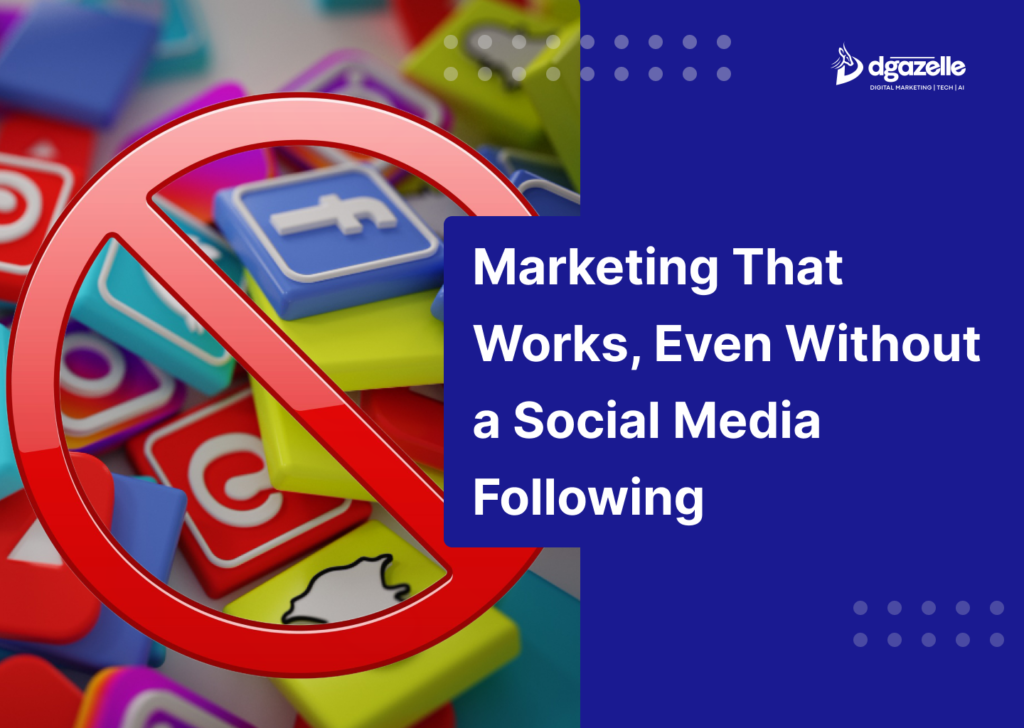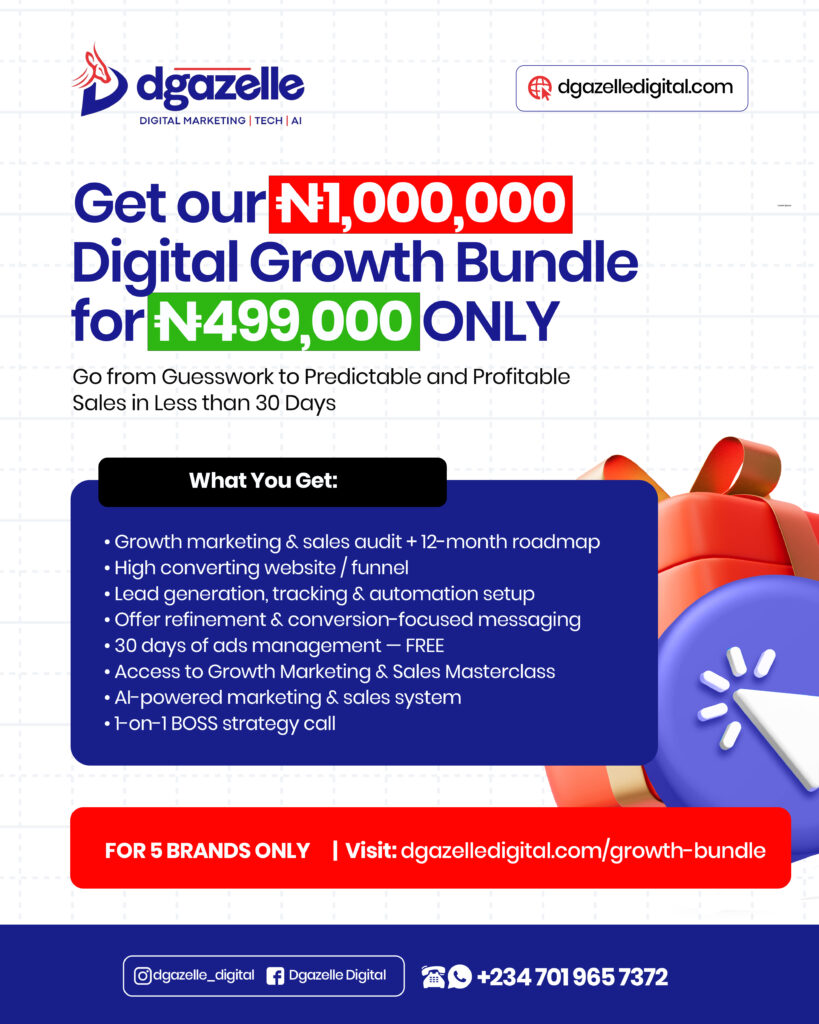Running an online business without social media presence? Sounds like the punchline of a joke, right?
Let’s be real — quitting social media can feel like stepping off a cliff without a parachute. You might wonder, “How will I get leads for my business? What happens to my marketing now?”
That’s exactly why we’re here — to craft a foolproof marketing strategy that doesn’t rely on social media but still drives growth, conversions, and engagement. Imagine confidently saying goodbye to endless posting, algorithm battles, and burnout — without a single backward glance.
To be clear, none of us at Dgazelle are against using social media. It can be a source of fantastic connections, a creative outlet, or just plain fun to use. In fact, several of my own closest real life friends I met on Twitter years ago! However, social media is absolutely not necessary to build and grow a successful business in 2025. Many SMEs have built successful brands by leveraging alternative digital marketing strategies — and you can too.
Finding the Right Marketing Strategy for Your Business (Without Social Media)
You can’t stepped away from Instagram, Facebook, and all the rest, without having solid marketing strategies already in place. So before you say “Adios” to Instagram, Facebook, X, or TikTok, it’s crucial to ask yourself:
What marketing strategy will replace social media? What foundations will you start building today so that you’re ready for tomorrow?
Let’s make this decision intentionally. You’re investing time, money, and energy into a strategy that could serve your business for years. Just like financial investments, marketing requires strategic thinking.
Imagine standing at a financial crossroads:
- Cryptocurrency: High risk, high reward, but volatile.
- Real Estate: Steady growth, tangible results, but slower returns.
Choosing between these isn’t about “crypto versus real estate.” It’s about understanding your overall investment strategy — what’s your risk tolerance, desired involvement, and long-term goals?
The same goes for choosing marketing strategies:
- Do you need quick sales, or are you building trust for long-term results?
- Can your budget support playing the long game, or do you need fast leads to stay afloat?
Email marketing, SEO, and traditional advertising are all tools — but your decision hinges on your business objectives and audience needs. By starting with a clear strategy, you’ll select the right marketing tools and confidently say goodbye to social media without scrambling back months later because you’re desperate for leads.
So, here’s the game plan: define your strategy, then pick your tools. Social media is just one option — but for you, it’s off the table. Ready to build a thriving business without social media? Let’s explore various approach.
1. Ask for Referrals
Never underestimate the power of a good referral. Happy clients can become your biggest marketing allies. Here’s how to leverage this strategy:
- Client Rewards: Offer discounts for every successful referral
- Personal Network: Ask friends and family to share your business card
- Email Marketing: Encourage subscribers to forward emails to interested connections
For instance, I’ve landed multiple projects just by asking satisfied clients to refer me to their networks. Referrals are proof that word-of-mouth marketing still works wonders.
2. Create an SEO-Friendly Website
A website is your business’s permanent address online, driving credibility, trust, and visibility. In fact, SEO drives over 1,000% more traffic than organic social media, with 68% of online experiences starting with a search engine.
Key benefits of having a website:
- Showcases your expertise
- Helps potential clients find you online
- Builds long-term trust
Don’t have a website yet? Start simple on platforms like WordPress, which offers beginner-friendly templates and self-hosting. Or invest in a professional website developer for a more robust solution.
3. Blog Consistently
Once your website is up, consistent blogging becomes a powerful tool to drive traffic and conversions. Valuable blog content helps you rank on search engines, offering solutions your audience is actively searching for.
Over time, I found that blog articles led to higher conversions. Why? People searching on Google are often ready to buy, unlike social media users who are in a passive browsing state.
Consider your own behavior: when searching for services or products, do you rely on social media or Google?
Most turn to Google with queries like “budget-friendly travel destinations” or “clean skincare products.” Blogging positions your brand to appear on search results and answer user queries, guiding readers toward your offers.
4. Host Workshops
Workshops allow you to showcase your expertise, raise brand awareness, and attract potential clients or customers.
You can lead your own workshop or collaborate with other businesses. For example, as an SEO consultant, I might host a workshop on “How to Grow Your Business with Website SEO.”
Here are other workshop ideas based on business types:
- Interior Designer: Crafting mood-boosting spaces
- Pet Brand: Training your dog effectively
- Travel Blogger: Budget-friendly travel tips
- Life Coach: Building self-confidence
Hosting workshops provides value to your audience while positioning you as an industry leader.
5. Pitch Podcasts
Did you know 40% of podcast listeners make purchases after hearing recommendations on a podcast?
Pitching podcasts with relevant audiences can elevate your brand visibility. When featured, you typically share insights, answer questions, and promote offers at the end of the episode.
Tips for a successful pitch:
- Check their website for a pitching process or send a personalized email.
- Showcase your expertise and why you’d be a great guest.
- Provide tailored topic suggestions.
Being authentic and engaging on podcasts builds trust and connects you with potential clients or customers.
How to Grow a Business Without Social Media
Step 1: Evaluate Your “Why”
Reflect on why you want to grow your business without social media.
Common challenges include:
- Lack of time
- Unclear messaging
- Doubts about offers
- Undefined target audience
If you’re seeking diverse lead sources, feel burnt out by social media, or have seen poor ROI, exploring alternatives may be beneficial.
Step 2: Understand Your Audience Deeply
Knowing your audience’s problems and aspirations is key to effective off-social marketing.
Exercise: Visualize your ideal client who achieved great results.
- Recall their initial questions, goals, and transformation journey.
- Use a grid to map frustrations, wants, fears, and aspirations.
This exercise provides insights for tailored messaging and offers.
Step 3: Develop a Body of Work
Create foundational content to establish your authority.
Steps to build authority:
- Choose 3-5 Core Themes: These represent your expertise.
- Topic Clustering: Support each theme with additional content (articles, resources, podcasts).
- Commit to Repurposing: Aim to reuse each content piece at least three times.
Step 4: Build an SEO-Based Marketing Funnel
Did you know 90% of online experiences start with search engines? Ignoring search limits your reach.
Here’s how a search-focused funnel works:
- Attract: Create content targeting problem-aware searchers.
- Engage: Inspire visitors to subscribe to your newsletter or another channel.
- Nurture: Build relationships through valuable content, establishing trust.
- Convert: Turn nurtured relationships into paying clients or customers.
Keep it simple. Don’t overcomplicate the process—focus on solving searchers’ problems.
Step 5: Build Referral Networks
Networking with both colleagues and competitors is a powerful, overlooked strategy.
Tips for building referrals:
- Identify people who serve similar clients, like web designers if you’re a copywriter.
- Reach out and establish mutually beneficial relationships.
- Ask for referrals without fear—the worst outcome is a simple “no.”
A strong referral network can drive high-quality business from aligned clients.
Step 6: Experiment and Track Metrics for Non-Social Marketing
Fear of trying new marketing strategies often stems from uncertainty. However, experimenting allows you to gather valuable data, helping refine your approach over time.
Tips:
- Create controlled tests for tactics like newsletters, guest blogs, or SEO campaigns.
- Measure leads, engagement, and conversion rates.
- Keep an open mind—remember, even “failures” yield insights.
Data-driven experiments reduce the guesswork in your marketing journey.
Step 7: Collect Data and Refine Strategies
After at least 90 days of marketing without social media, analyze your performance.
Ask yourself:
- ROI: Did you generate meaningful revenue?
- Client Fit: Were leads well-aligned?
- Time Efficiency: How demanding was execution and follow-up?
- Sales Lifecycle: How long before tactics delivered results?
These insights guide future efforts, helping you focus on what’s working and make necessary tweaks for better outcomes.
Conclusion
There are many ways to market your business, reach your target audience, and make sales without using social media platforms. What’s helped me grow my business is remembering there’s no one right way to reach your goals and to focus your time and energy on what works best for you and your brand.
Ready to ditch social media and build a marketing strategy that works for your business? Let’s go beyond trends to sustainable, impactful growth.







